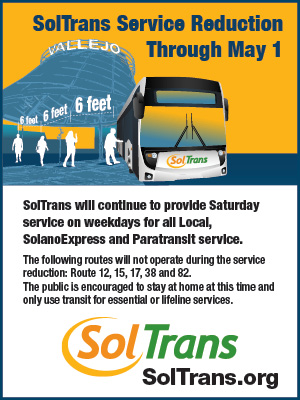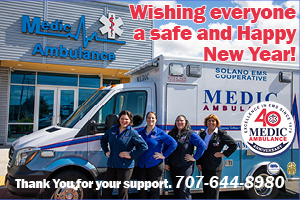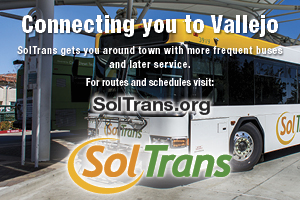Improving the lives of children and family for decades

By James Quinn
With so many children and families in need every day, we are very fortunate to have the Children’s Network of Solano County (CNSC) in Fairfield, a registered 501(c)3 organization that, in my opinion, goes above and beyond their mission statement of “improving the lives of children in Solano County through education, advocacy, coordination of community services and community-based collaboratives” (childnet.org).
Established in 1982 by the Solano County Board of Supervisors, the Children’s Network started as a fundraising arm for the Children’s Network Council (now called the Solano Children’s Alliance), which is a 20-membered body appointed by said board. “It was originally formed because a local Children’s Shelter had closed, causing a big uproar in the community about who is paying attention to what kids need,” Executive Director Ronda Kogler said. Kogler served as CNSC’s director of operations for 22 years until recently starting as executive director on July 1st (after Alan Kerzin retired with six years of service).
CNSC has since branched out and expanded—where they do so much to serve their community—as a nonprofit that stands up for child rights by dedicating their organization to protecting them and making their lives better. Their website highlights just some of what they do: “The Children’s Network promotes programs that support families, secures funding for children’s services and programs, influences policy at the local and state level, helps families access services, and collects and publishes data on the health, safety, and well-being of Solano County children” (childnet.org).
Kogler was able to elaborate on this list when she told me that the organization stays active in a lot of projects that encourages civic engagement. “We’ve run the Parent-Leadership Training Institute (teaching parents how to advocate for their kids),” Kogler said. “We staff Solano Youth Voices, which is a council of youth that have developed a public policy platform.” In other words, the organization values not only keeping the youth involved in their communities but also giving voice to minors as allies in the decision-making, the collaborative process behind the policies that affect them.
Part of what makes CNSC such a strong community staple is not only what it does for it but also how it utilizes networking (living up to its name) to work smarter via collaboration. For instance, in addition to their dedicated staff, volunteers and their Board of Directors, the organization partners with local advocates that comprise: (to only name a few) the Solano Children’s Alliance, who acts as the County’s Child Abuse Prevention Council, and Local Child Care Planning Council. They are also partnered with SparkPoint Solano Progam, Solano Family Resource Center (FRC), Solano Youth Voices, and others—all “to assure there is a strong, united, independent voice for all of our children” (childnet.org).
In order to effectively carry out their mission statement countywide, CNSC takes a systematic approach, where the first step is uncovering the need by asking the right questions, evaluating current processes, identifying gaps and figuring out what areas need the most support (childnet.org). Next, through collaborating and coordinating, Children’s Network forms community networks to address particular needs and how to provide the best services. “That includes direct involvement in coordinating those services and programs, which includes developing funding for programs, training, education and facilities development” (childnet.org). Lastly, to facilitate change and make a greater youth impact, the organization focuses on advocacy. Their website continues, “We make recommendations to local and state leaders and address policy issues that directly affect our community. We inform policymakers on the gaps in services and encourage action to fill those gaps” (childnet.org).
A big community need that CNSC advocates for is helping families—as a nurturing family and home that provides a safe, positive environment go hand-in-hand to a child’s healthy development. “To improve the lives of children, we need to remember that all children are part of families, so really that means we have to pay attention to family needs and family supports,” Kogler said.
One of the main ways CNSC helps families is through childcare, which is not only an urgent, national need but also an expensive one. It is no secret that childcare is usually one of the largest expenses that a family has, yet not all families have the ability to access childcare and the money to afford it (e.g. expensive diapers, food, along with clothes that children quickly grow out of). It may also seem counterintuitive that whereas childcare is so expensive, childcare providers are still poorly paid. CNSC, however, provides programs and services to help with childcare, as well as helping families get access to other basic needs assistance and benefits available to them.
Koger continued, “We need to make sure families have supports in place to help prevent child abuse and ensure they can thrive. This means advocating for kids’ needs both at the local, state, and federal levels, paying attention to and supporting family-friendly legislation.” Some of these supports could even mean helping families who are in urgent need with stressful expenses such as assistance with their rent, utilities, etc.
CNSC collaborates with the government locally (at the county level), which sometimes makes an impact at the state level. “Local changes can have statewide implications. Every voice counts.” Kogler said. For example, the organization recently advocated for a bill to change the eligibility rules for subsidized child care for Solano families. Kogler continued, “Our Local Child Care Planning Council (LPC) went to Jim Frazier, along with other LPC councils, and said that the rules around subsidized child care weren’t working for our families. We advocated for a pilot project [AB-377 Child Care Subsidy Plan that Governor Brown signed in 2017]. That pilot said that we could change some of the rules for our county so that more families can access subsidized childcare. Because we did that work locally, now the state has passed AB-2626 [child care bill passed in 2018], which takes a lot of those provisions and makes them statewide.”
According to their website, another local action that affected the state is when they: “worked successfully with the courts to establish a policy of imposing restitution fines from those convicted of child abuse. The fines are used to support local child abuse prevention work” (childnet.org). This ruling is huge in rendering mandatory restitution to direct victims of child abuse. CNSC clearly makes a significant impact in our community by taking action to make a difference.
CNSC is a great example of people and government working together to establish much-needed public services that the community wants. Community relationships are fundamental to the organization—something that they have carried with them since their founding.
On that note, CNSC staff likes to support monthly public meetings of the Solano Children’s Alliance, which you can attend on the first Wednesday of each month. Their next one is scheduled for August 7th—with the topic of Mental Behavioral Health—at Solano Family and Children’s Services (SFCS): 421 Executive Ct N # A, Fairfield, CA 94534. This meeting would be a great opportunity to learn additional information for free, and Kogler encouraged me and anyone else to attend. See a full schedule of their public meetings on their website’s homepage.
Donate to the nonprofit organization on their website at childnet.org/get-involved, where your contribution can help change the future of a child and their family. Plus, since they are a registered 501(c)3, remember that donations are tax-deductible.
Children’s Network of Solano County is located on 827 Missouri Street, Fairfield. They have a great website, full of information on resources and services such as financial support and volunteering opportunities. Visit them at childnet.org, and be sure to “Like” their Facebook page @TheChildrensNetwork to follow them for convenient updates, event dates, etc. Call Children’s Network of Solano County at (707) 421-7229 or email them at childnet@childnet.org.
For Child Welfare Services, call (707) 784-8791. To report incidents of abuse or neglect, call their 24-hour hotline at 1-800-544-8696.
 James Quinn lives in Benicia and teaches at Elmer Cave Language Academy in Vallejo. A UC Davis alumnus in English, he now studies education as part of Touro University’s Master’s in Education program. Along with teaching, he tutors and writes often. He is working on a novel that takes place in Benicia. See his website at mrquinnj.weebly.com.
James Quinn lives in Benicia and teaches at Elmer Cave Language Academy in Vallejo. A UC Davis alumnus in English, he now studies education as part of Touro University’s Master’s in Education program. Along with teaching, he tutors and writes often. He is working on a novel that takes place in Benicia. See his website at mrquinnj.weebly.com.




















































